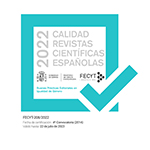Traduire des stéréotypes lexicaux du français contemporain : le cas de 'dérive' et ses traductions vers l’espagnol
Résumé
L’objectif de cette étude est d’analyser d’un point de vue sémantico-pragmatique certaines techniques de traduction appliquées pour gérer l’imprécision sémantique des stéréotypes lexicaux du français contemporain dans les traductions. À partir d’une étude de cas qui examine la présence de l’unité lexicale dérive et ses traductions vers l’espagnol dans un corpus de textes spécialisés, le travail illustre les réponses possibles des traducteurs lorsqu’ils spécifient dans le texte cible l’extension sémantique d'une unité lexicale telle que dérive, qui peut se prêter à un large éventail de possibilités interprétatives. Cette analyse contrastive sert de point de départ à une réflexion plus générale sur la subjectivité du traducteur et son degré d'intervention dans le texte traduit.
Téléchargements
##submission.format##
Licence
La revista Thélème. Revista Complutense de Estudios Franceses, para fomentar el intercambio global del conocimiento, facilita el acceso sin restricciones a sus contenidos desde el momento de su publicación en la presente edición electrónica, y por eso es una revista de acceso abierto. Los originales publicados en esta revista son propiedad de la Universidad Complutense de Madrid y es obligatorio citar su procedencia en cualquier reproducción total o parcial. Todos los contenidos se distribuyen bajo una licencia de uso y distribución Creative Commons Reconocimiento 4.0 (CC BY 4.0). Esta circunstancia ha de hacerse constar expresamente de esta forma cuando sea necesario. Puede consultar la versión informativa y el texto legal de la licencia.









